20 May 2014 | Asia and Pacific, East Timor, News, Politics and Society, Young Writers / Artists Programme
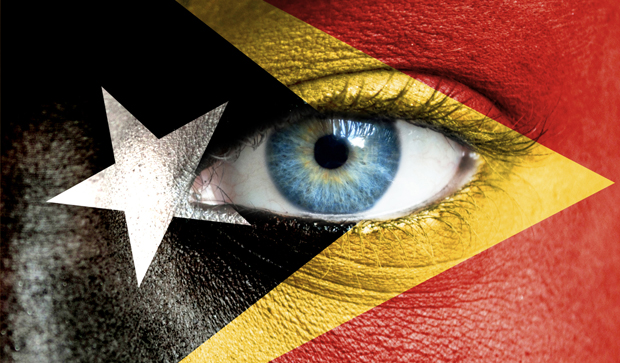
(Photo: Shutterstock)
Twelve years ago East Timor, or Timor-Leste, was recognised as the 191st member of the United Nations after a devastating 25-year Indonesian occupation. The fledgling democracy has since faced unprecedented challenges in building and maintaining its infrastructure, institutions and society after a UN-effort to help rebuild the tiny, impoverished island of 1.1m people. Adding to this struggle, the government has recently been criticised after a media law was ratified on 7 May, which seeks to regulate the media by imposing restrictions on journalists.
The legislation requires journalists complete a six, 12 or 18 month internship with a certified media organisation that must be recognised by a government-funded press council. These laws effectively exclude citizen, freelance and student journalists from publishing anything, with the prospect of fines and disciplinary action if they do. Foreign journalists, too, will now be compelled to apply to for accreditation and permission from the same council to report inside the country. Further restrictions are enumerated in Article 17, which states that “The profession of journalism cannot be performed concurrently with the following functions,” listing civil servants, office holders in local authorities, members of political parties, people in public relations and those involved in advertising. Violation of this “shall be punished by a fine of $250-$1000”, more than a month’s salary for most Timorese.
The constitution of East Timor is written with admirable clarity and Articles 40 and 41 enshrine freedom of the press and of expression for all citizens. The Timor-Leste Journalists Union pleaded its concern about the restrictive effect the law would have upon them, recognising the long shadow of censorship implicit within it. They were endorsed from outside by the International Federation of Journalists (IFJ), who called “on the government of East Timor to take heed of the concerns raised by its media in developing the country’s new media laws. Any legislation that would limit the capacity of local and international journalists reporting on East Timor also limits the public’s right to know and is of great concern to the IFJ.”
The weekly publication Tempo Semanal is edited by José Belo, perhaps the most eminent and decorated journalist in the country. Belo was rated as ‘one of the top 100 information heroes’ by Reporters Without Borders for his role in documenting the Indonesian occupation and his integral position in building the democratic media in East Timor. He has been vociferous in his criticism of the legislation, saying it “gives excessive powers to a state funded media council with the power to impose penalties that will be used to control journalists.” One of Belo’s exposé led to the imprisonment of a government minister for corruption in 2012, and despite its democratic nature, the country was ranked at 119 out of 177 countries surveyed in Transparency International’s 2013 Corruption Perceptions Index. Indeed, Australian freelancer Meagan Wymes, of The Dili Weekly, another paper in the capital, wrote that “it is incredibly difficult for journalists to access what should be public information through official channels. When it comes to reporting on corruption in any depth, this tightly controlled environment makes it very difficult. For most investigative stories, leaks are required from within the government or public service.”
Belo went further, saying: “It seems to me the Press Council is likely to be police or prosecutor – even judge – for journalists and media.” Having also worked for outside news agencies – like The Associated Press – during the occupation he was naturally concerned that “foreign correspondents who have played a key role in our struggle for independence will not be able to operate freely” alluding to Article 25 of the new law, which requires agencies of foreign media to register and gain permission before being allowed in to report.
It is the contention of the government that the largely unprofessional nature of the emerging media often results in inaccurate and unbalanced reportage, sometimes blurring the distinction between fact and opinion. A regulatory law and mandatory training is needed to increase standards, they argue. This is not entirely unreasonable and Toby Mendel, an international human rights lawyer for the Centre for Law and Democracy, told Index: “It could be useful for the country to pass a media law. As in most young democracies, the press there is just establishing itself and this inevitably leads to a measure of unprofessional behavior.’” Mendel, though, was critical of a number of “problematic” provisions in the law, and specifically noted “the biggest problem is control over who is a journalist, pursuant to Articles 12 and 13, and the fact no one may work as a journalist without being accepted into the profession. This is completely contrary to international standards.”
There are a handful of daily and weekly publications in East Timor and the print media remains quite small largely due to a near 50 per cent illiteracy rate and high publishing costs. Radio is the widest reaching channel of information reaching some 63 per cent of the population monthly, with public TV estimated to be watched by around half. Internet access is extremely limited, though not censored, and reaches around 1 per cent of the population, according to Freedom House. The US-based NGO also rated the country as “partly free” and reported that already “journalists practice self-censorship and authorities regularly deny access to information. The free flow of information remains hampered by poor infrastructure and scarce resources.” The prevalence of two main languages, Tetum and Portuguese, as well as multiple different dialects, further complicates the process and distribution of news and events to citizens. East Timorese NGO, La’o Hamutuk, added its voice to the sceptics, saying that: “Timor-Leste has already gone for more than a decade without a media law and we have not had problems with media and information, During this time, Timorese people enjoyed their right to information and freedom of expression through various media, after nearly five hundred years of repression and censorship.”
This is a nation where around 60 per cent of the population is under 24 years old and where around 40 per cent of citizens live below the international poverty line. After centuries of Portuguese colonialism –then a brief 10 day sojourn of independence- a quarter century of brutal Indonesian occupation followed razing the infrastructure and intimidating the populace of the island. The UN mission here had to effectively re-author the state from ruin and is regarded as one of their biggest success stories, producing a self-determining democratic government.
For the optimist it may be that the passing of this law is a well-meaning, essentially benign attempt to produce more professional standards of journalistic conduct. Though it seems a number of the conditions extend beyond that, bordering on constrictive regulation. A government statement read: “Its purpose is primarily to regulate the activity of professionals, adequately prepared and ethically responsible, so that they can inform the public objectively and impartially and encourage active and enlightened citizenship by the population, thus contributing to a democratic society.” All very well in theory, then, though its imposition in practice could be much more sinister.
The passage of time will determine what effect this law has on the press in real terms and it remains unclear how authoritatively the regulations will be enforced. If this nascent democracy is going to develop properly, an unhindered press will be vital to that process. However, these restrictions could, in potentia, open the door for parliamentary encroachment and censorship, stunting the growth of a nation just embarking on its first experiment in self-rule.
This article was published on May 20, 2014 for indexoncensorship.org
15 May 2014 | News, Politics and Society, Turkey

Turkish Prime Minister Recep Tayyip Erdogan (Photo: Philip Janek / Demotix)
Last Thursday, after nearly eight years of detention three journalists were among a group released from a prison near Istanbul. The journalists Füsün Erdoğan, Bayram Namaz and Arif Çelebi were arrested in 2006 and accused of belonging to the Marxist-Leninist Communist Party (MLKP), which is considered a terrorist organization in Turkey. For journalists and activists who had been closely following the case, the sudden release came as a surprise after months of resistance from local courts.
In November 2013, seven years after her arrest, Erdoğan was sentenced to life in prison for her alleged involvement with the MLKP. She has denied involvement with the group. In a letter Erdoğan wrote that was published by the CPJ last year, she explicitly rejected the charges: “In reality, there was only one real reason for our arrest: police were trying to intimidate members of the progressive, independent, democratic, and alternative media.” Erdoğan is a founder of the leftist radio station Özgür Radyo and began writing for the independent news website Bianet while in prison, mailing editors her regular dispatches, says Elif Akgül, Bianet’s freedom of speech editor.
Earlier this year, judicial reforms in Turkey brought down the maximum legal detention time for prisoners awaiting sentencing in terrorism cases from ten years to five. While Erdoğan had been sentenced in local court, she is still awaiting a verdict from an appeals judge. Following the new reform, Erdoğan’s lawyers applied for her release from prison, but the request was denied in March. Around the same time, eight journalists were released who had been detained in 2011 and were accused of belonging to the Kurdish KCK union, which is also considered a terrorist organisation in Turkey.
The turnarounds over the past months, from Erdoğan’s life prison sentence last year to her release from prison a few days ago, have exposed the Turkish judicial system’s capacity for dragging on a case in uncertainty. Erdoğan was not informed of the charges against her until two years into her detention, and served nearly eight years without receiving a final verdict. Now, after Erdoğan’s sudden and unexpected release from prison, the court’s decision also shows the opacity of court regulations in Turkey. The implications of a broken judicial system for press freedom are troubling—especially in a country with consistently high numbers of jailed journalists.
Füsün Erdoğan’s case has attracted the attention of advocacy organizations like the Turkish Journalists’ Union, the European Federation of Journalists, the Committee to Protect Journalists and Reporters without Borders. Because she’s a Turkish-Dutch dual citizen, last year the Dutch Association of Journalists (NVJ) also began campaigning for her release.
Thomas Bruning is general secretary of the NVJ and has started campaigns in the Netherlands to bring attention to Erdoğan’s case. What drew the most reactions, he says, was when the NVJ had 10,000 posters made featuring a picture of Erdoğan with the text “Füsün Erdoğan must be free” and “journalists are not terrorists” in Dutch. The association sent the posters out to subscribers of their magazine and asked them to share pictures of the posters on social media. Over the last few months, Bruning and the NVJ have also been in contact with Erdoğan’s son, and Bruning gave a speech outside the Dutch parliament when Erdoğan’s son went on a hunger strike there to draw attention to his mother’s case. Now that Erdoğan is out of prison, the NVJ is focused on having the charges against her dropped. “We always said that there are two problems left – one is that, although in the last few months journalists have been released, there are still a lot of journalists in prison in Turkey. The second is that Füsün is released but the charges haven’t been dropped yet. She’s not free to travel and she’s awaiting the appeal. She’s not a free citizen,” Bruning said.
Füsün Erdoğan’s surprise release from prison is not an indicator of lasting change in Turkey’s press freedom situation. During its 2013 prison census, the CPJ reported that 40 journalists were in Turkish prisons. Yesterday, five more journalists were released from prison who had been held in connection to the KCK case. Despite the release of multiple journalists this year, the CPJ estimates that at least 11 journalists are still imprisoned in Turkey.
At protests in Istanbul on May 1, journalists were detained and Bianet reported that at least 12 were injured. A few weeks ago, the journalist Önder Aytaç was sentenced to ten years in prison for a 2012 tweet that insulted Prime Minister Erdoğan. Akgül says freedom of speech is evolving but not improving in Turkey. “In the 1990s, you were killed for being a journalist, in the 2000s you were arrested for being a journalist. Right now, you become unemployed if you’re a journalist,” she said.
Erdoğan’s legal situation remains precarious as she awaits appeal trial, but while Akgül says her release is a positive development, the case is a warning sign for the media climate in Turkey. “It’s a threat not just for the journalists who are on trial, it’s a threat for the others too,” said Akgül. “Because a journalist now working in Turkey, writing critical stuff, knows they can be jailed for being a terrorist member, administrator, member, they can be jailed for lifetimes.”
This article was posted on 15 May 2014 at indexoncensorship.org
14 May 2014 | Middle East and North Africa, News, Yemen
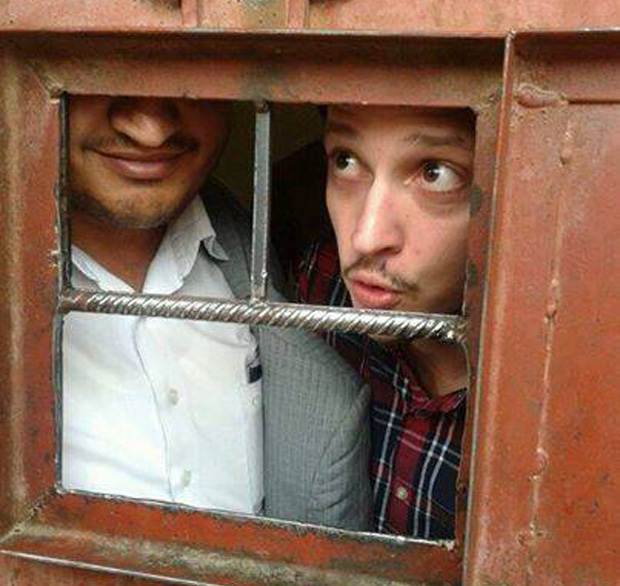
American journalist Adam Baron in jail. He was deported from Yemen last week. (Image: @almuslimi/Twitter)
Working in Yemen as a journalist can often feel like being an involuntary character in a clichéd Hollywood drama — a hybrid of a John le Carré novel and a Johnny English-style parody.
In over three and half years living in Yemen I’ve gone on the run from government agencies on four occasions. Looking back months later you either laugh or shake your head in despair at the surreal madness of it all.
One occasion involved a more than six-hour drive across part of rural Yemen popular for US drone strikes, with a local journalist alongside me. Exhausted and relieved, our successful getaway ended just before dawn.
Another was, in hindsight, rather more comical. As Yemen’s uprising intensified in April 2011, district security chief came knocking on the door in the middle of the night. He was looking for journalists and demanded copies of foreigners’ passports. It was a few weeks after soldiers had stormed the house of three foreign journalists who were then deported. The young, clandestine-revolutionary who guarded the apartment block where American journalist Jeb Boone and I were temporarily staying, managed to put the official off until the next day.
Under the cover of darkness we each packed a small rucksack of essentials: cameras, notebooks, and a change of clothes, while planning our escape to a friend’s house which had been left empty following the evacuation of the majority of the ex-pat community due to deteriorating security in Sana’a. As we made our furtive escape, creeping out of the gate in the early hours of the morning we walked straight into a truck full of soldiers parked outside the next-door neighbour’s gate. George Smiley wept.
The third almost ended in disaster. After writing a piece in January last year for The Times on Saudi Arabia’s involvement in America’s covert war in Yemen, on advice, I once again temporarily relocated in Sana’a amid fear of reprisals for my reporting. A couple of weeks after returning to my Old City home the taxi I was travelling in was ambushed outside the Ministry of Defence. A bullet smashed through the window next to my head, hissed through the hair of my driver but miraculously left both of us unharmed. Since then I have probably become the only woman in the world to convert their United Nude shoe bag into a gunshot trauma kit which I’ve since carried with me at all times.
But, as foreign journalists we have little if anything to fear. The worst that’s likely to happen to us, as American journalist Adam Baron found out during his deportation last week, is a 10-hour spell in jail wondering if we’re going to be given a few minutes to pack before being kicked out of the country we call home, without the possibility to return.
While we — the handful of foreign journalists based in Yemen — might have anxious moments once or twice a year, our Yemeni colleagues are constantly under threat. Yemen remains amongst the bottom 15 countries out of 180 in the world for press freedom. A Human Rights Watch report last September concluded that freedom of expression since President Abd-Rabbu Mansour Hadi took power in February 2012 has increased, but along with it, intimidation and violence against journalists has also risen. Yemen’s Freedom Foundation recorded 282 attacks and threats against journalists and media workers in 2013.
While Adam waited anxiously in jail last Tuesday, passport and phone confiscated, unease spread. Officials indicated that “other foreign journalists were next” my name was also mentioned. Not knowing if they’re coming to get you today, tomorrow, or at all, means that despite the relatively benign consequences, you are gripped with an almost unbearable sense of apprehension. Preparing for the worst I informed my editor at The Times in London and started to pack.
Three days later, still waiting, the madness felt like it was closing in. As the sunset over Sana’a on Friday evening one friend called to tell of gunfire and explosions next to his house. Meanwhile I sat in the protective darkness of my stairwell whispering into my phone as I heard the distant voices of two men banging on my front gate. Was this it? Was this the moment I would be forced to leave? My phone — on silent in case it was heard by those outside — lit up. Another friend had just narrowly avoided driving straight into a running gun battle in the south of the city. I tiptoed down the stairs in the dark and silently slid the two deadbolts across the large wooden door of the ancient Yemeni tower-house that is my home.
The irony is that while the ex-pat community goes into week two of lockdown in Sana’a and Western embassies close to the public due the increasing threat from al-Qaeda attacks, the most persistent threat to journalists on a daily basis is from the government and its intelligence agencies, not so-called militants.
After Adam was deported last week, for the first time, I decided not to run as I have too many times in the past. Without stopping and challenging what the government has done means the persecution of journalists will continue unabated.
There are just a small handful of foreign reporters based full-time in Yemen. Adam and I were the only ones accredited in a country where the government makes it almost impossible to live permanently as a foreign journalist with the correct paper work. Deporting unregistered journalists means no complaints can be made when individuals are thrown out.
As a legally operating reporter I had firm ground to stand on to support Adam and raise questions about why the government has chosen this moment to target him, and possibly me. Was this a personal vendetta against him? Or, was this a concerted effort by the state to remove witnesses? Those who may witness the consequences of a US-backed war currently being waged in the most significant military crackdown against al-Qaeda every carried out in Yemen.
The answers to those questions were partly answered by the manager of immigration who pulled me aside at Sana’a airport on Monday morning when I chose to leave Yemen of my own accord. I realised I’d had enough of the constant cycle of farcical drama, instigated by the state, that comes with living as a journalist in Yemen over three and a half years. I wanted it to stop. To take back control.
Despite the fact that my journalist visa is valid until February 2015, the immigration official began with “you can’t come back…” and ended with “it’s OK, you are allowed to leave now”. For the latter at least I was grateful.
The foreign media may not be welcome in Yemen, but if they are quietly trying to remove us then the greatest threat to be faced will be to domestic reporters. Over a snack of traditional sweet kataif pancakes and chilled apricot juice on my last day in Sana’a on Sunday, I sat with a Yemeni friend and fellow journalist. He acknowledge the need to step back from the madness. “The national security, they get to you,” he said tapping a finger against the side of his head. “You need to go home for some quiet time,” he added. “I got my quiet time…in prison.”
This article was posted on May 14, 2014 at indexoncensorship.org
8 May 2014 | Azerbaijan, Azerbaijan News, Europe and Central Asia, News
This week eight young Azerbaijani activists were sentenced to between six and eight years in jail. The members of the N!DA Youth Movement, which works for democracy and social change, were convicted for possession of drugs and explosives, and for intending to “cause public disorder”. The charges are widely believed to be trumped up, and the trials have been criticised by foreign observers over “irregularities” and “shortcomings”, including inconsistencies in testimonies and mishandling of evidence.
This is just the latest addition to a long list of human rights abuses by authorities in the oil rich country. As the repression has largely been allowed to take place away from international attention, this is a good moment to remember a few things about Azerbaijan, especially as the country prepares to take over a six month chairmanship of the Council of Europe’s Committee of Ministers.
1) The six are far from the only political prisoners in Azerbaijan
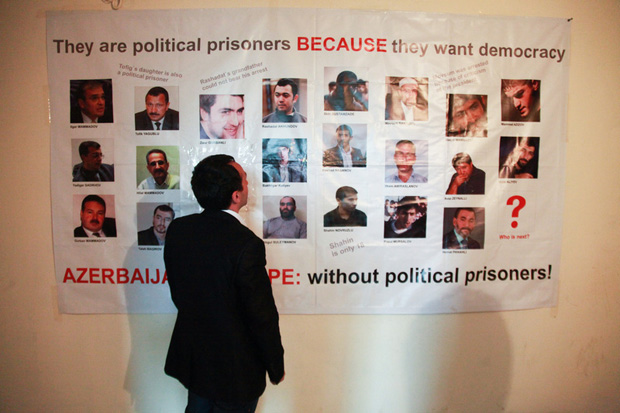
(Image: Aziz Karimov)
According to the latest figures, there are 142 political prisoners in Azerbaijan today. These include human rights defenders, youth activists, and a large number of religious activists, among others. There are currently 17 people serving life sentences. Ahead of the country’s presidential election last October, candidate Ilgar Mammadov was arrested. In March, he was sentenced to seven years in prison for “organizing mass disturbances” and “resisting the police”. Meanwhile, President Ilham Aliyev insists that there are no political prisoners in Azerbaijan.
2) You may escape imprisonment, but you could still face violence and intimidation
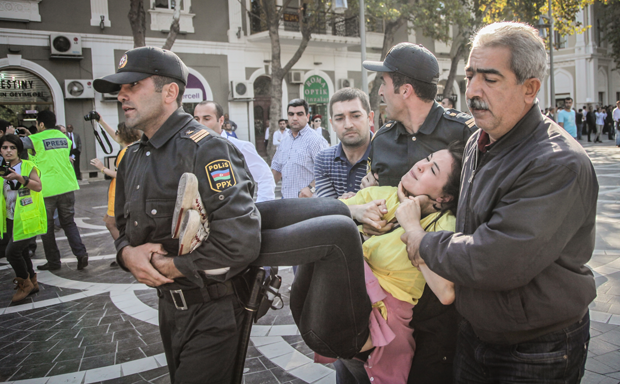
(Image: Aziz Karimov)
Attacks, threats and intimidation are regular occurrences for political opponents, activists and press in Azerbaijan. Following protests in the capital Baku as Aliyev secured his third consecutive term in power last October, demonstrators were beaten and detained by police. Police also raided the offices of independent Election Monitoring and Democracy Studies Centre (EMDSC) which reported irregularities in the election. In 2012, reporter Idrak Abbasov was brutally beaten when filming the demolition of a house by the State Oil Company of Azerbaijan, allegedly by employees of the company and police. The same year, fellow journalist Khadija Ismayilova, known for covering corruption among the country’s powerful elite, was blackmailed with intimate images of her and her boyfriend. She continues to face intimidation today. These abuses are often allowed to happen with impunity.
3) Independent and critical media are under threat

(Image: Alex Brenner for Index on Censorship)
Azerbaijan’s critical press have long been subjected to an array of attacks. Independent news outlets face economic sanctions, and are often barred from distribution networks. Some 70% of distribution is controlled by the government. Most of the nine national TV channels are either directly owned by the state or controlled by the authorities. Journalists also fall victim to legal threats. In the first six months of 2013, 36 defamation suits were brought against media outlets or journalists, four of which were criminal defamation suits. One victim of this hugely restrictive media environment is leading independent paper and Index Award winner Azadliq. The paper has been hit with £52,000 worth of fines following defamation suits, state-owned press distribution company Gasid has not been transferring payments that reflect the paper’s sales. Azadliq claims Gasid owe them some £44,000.
4) Authorities are on an ongoing PR mission
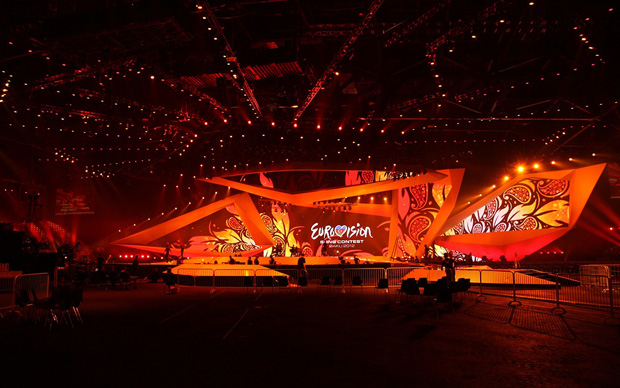
(Image: Zeljko Joksimovic/Wikimedia Commons)
While the situation inside the country shifts between bad and worse, authorities have focused their attentions on a wide-reaching international PR campaign. Ahead of hosting the Eurovision Song Contest, authorities ordered urban renewal that saw houses demolished and families evicted. Vast sums have in recent years been poured into the radical regeneration and beautification of Baku, and there’s more to come. There is also the posh London bar Baku, owned by the Aliyevs; the glossy, internationally distributed Baku magazine, edited by first daughter Leyla and co-published by Conde Nast; and the sponsorship deal with Champions League finalists Atlético Madrid. Next year, Baku will again play host to a prestigious international event — the inaugural European Games.
5) They are about to take charge of one of Europe’s most important human rights bodies
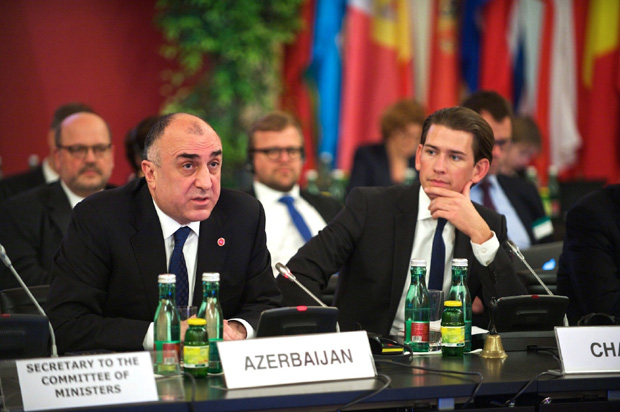
(Image: Sandro Weltin/Council of Europe)
“The Committee of Ministers supervises the execution of judgments of the European Court of Human Rights the Council of Europe…The Committee of Ministers’ essential function is to ensure that member states comply with the judgments and certain decisions of the European Court of Human Rights,” the Council of Europe declare on their website. Next week Azerbaijan will assume the chairmanship of this very Committee of Ministers. But one could say that COE is only sticking to form in its relationship with the country. Only last year, a majority in its Parliamentary Assembly (PACE) voted down a resolution on the existence of political prisoners in Azerbaijan.
This article was originally published on 8 May 2014 at indexoncensorship.org








